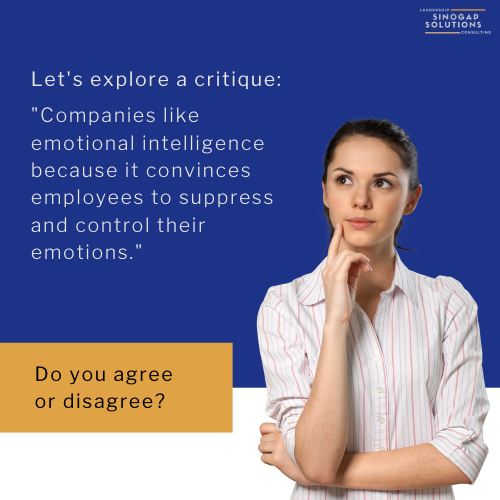Copywriter & Chief Editor | Asyah Saif | Grammatica Communications Ltd.
We have to challenge ourselves to become better. If there is a critique about something, it is important to listen to it, hear it, and see what we can learn from it.
Adam Grant is an organizational psychologist that runs the ReThinking podcast. In an episode titled “Emotional Intelligence as Corporate Control” featuring Merve Emre, they present some critiques of emotional intelligence. This episode is based on an article by Emre in the New Yorker for the 25th anniversary of Daniel Goleman’s bestselling book Emotional Intelligence. Emre’s main argument is that, in the wrong hands, emotional intelligence can be used to exploit people.
Critique 1: Companies like emotional intelligence because it convinces employees to suppress and control their emotions.
Emre notes that emotional intelligence as a concept and practice became wildly popular in the corporate world over the past two decades. She wanted to really understand what employers were gaining from it and why they were spending all this time and energy on it.
Emre felt that emotional intelligence is used to convince employees to control themselves and their emotions, repressing any resentment they might have towards the conditions in which they have to work, including conditions where their psychological wellbeing is made available for profitability.
What stands out in this critique are the concepts of controlling emotions and repressing feelings of resentment. This signals a fundamental misunderstanding of what emotional intelligence is.
Are these companies doing that? Possibly. Can organizations twist the concept of emotional intelligence to fit their agenda? Perhaps. However, in these cases, there would be a fundamental misunderstanding of what emotional intelligence is. Emotional intelligence is not about suppressing emotions; it is about understanding your emotions, how they may manifest in yourself, and how you can better regulate them to achieve a positive outcome. We use the word regulate rather than control because we are not always in control of our emotions; moreover, the period of time between an emotion and an action can be a split second. Regulating emotions is not to repress them but to understand how they affect us and how to better make decisions.
What is a positive outcome? The answer is personal and unique to each person, and ties into their self-awareness of their purpose and values. This translates to being able to work for companies with congruent values and purpose. In these cases, personal positive outcomes will likely align with positive outcomes for the organization.
If you get to a point in your career where you feel that there is misalignment between your needs and values and that of the organization, it is important to work through that and know what can be done to move forward. Do you stay and try to change the circumstances you work within? If that is not possible, do you leave? And how do you leave? Do you have control over that?
Critique 2: Social context has been erased from studies on emotional intelligence.
Emre notes that, in her opinion, much of the research around emotional intelligence neglects the macro level—the social and historic contexts. Grant brings up the Walter Mischel marshmallow study, where toddlers were given one marshmallow and told to wait 15 minutes; if they succeeded, they were given two marshmallows. This research found that toddlers that were able to resist the temptation to eat the one marshmallow and hold off to get two later in life got better grades and performed better on LSATs. However, recent research shows that there is a significant social class difference in who was able to delay gratification. For example, kids who grew up in poverty were much less likely to resist eating the one marshmallow.
Both Emre and Grant felt that this example ties to the lack of inclusion of the social context that has been erased from studies on emotional intelligence.
Context matters. Dr. Pagonis recognizes that she is a qualitative researcher and not a quantitative researcher. She doesn’t study numbers to provide a statistical significance. Instead, she collects people’s stories, and through the stories she tries to explain behaviour and uncover deeper concepts and predictions. This philosophical paradigm is called constructivism: our environment, our culture, our religion, and the aspects that form part of our identity influence how we construct meaning around us. You can’t understand or explore human phenomenon without taking into consideration the context that it is occurring within. With that philosophical paradigm and approach, Dr. Pagonis made the discovery of emotional intelligence within her research data.
The third domain of emotional intelligence is social awareness, which is centred around awareness of self and others. Empathy is an important concept within this domain. Empathy allows for understanding of others’ experiences through their values, beliefs, and dimensions of their identity, not your own. When we are able to do that, we start to pay attention to their context.
“Suspending our own context is really hard, but when we practice to do that, we can create a brave space where people feel that they themselves possess the courage to share their experiences”
Dr. Johanna Pagonis
We all have the capacity to develop emotional intelligence, and it is important to understand that some people will have barriers that will make it harder for them to self-regulate. For example, trauma changes the brain’s neuroplasticity: the ability of our brain to grow, develop, and adapt based on the circumstances in our environment. Trauma changes our ability to adapt, modify, and challenge stress in a healthy way. This can impede our ability to be emotionally intelligent. It doesn’t mean that it is impossible—it means that we have to work harder at it.
“I encourage us to think of trauma as ‘big T’ and ‘little t’ trauma. We may have some major traumatic incidents that may have happened to us, but we also may have smaller traumas that may have impacted us on a more personal level. They are both part of that context piece.”
Katie Allan
Making an assumption that it is easy for anyone to be emotionally intelligent goes against what emotional intelligence is. If you are emotionally intelligent, you can respect and value that not everyone will be able to manage their triggers in a productive way. It takes compassion and patience to do that.
In some ways, the marshmallow study makes a similar point. Context matters.
Critique 3: Organizations use emotional intelligence training as a band-aid solution instead of addressing organizational and systemic problems.
Emre talks about how emotional intelligence training is often used as a band-aid and what we need to do instead is to heal a sick culture. Emre and Grant talk about how workers were stressed and overwhelmed across many industries during the pandemic. Changes to sick leave or work from home policies would have been beneficial to workers, but instead people felt like they were given mindfulness lunch & learns or one-off solutions. This individualizes the problem when the organization or society are responsible.
If you are emotionally intelligent as an organizational leader, you understand the power of empathy and inclusive decision making. In practice, this translates to reaching out to your employees and learning how they are doing and what they need to succeed.
During the pandemic, we talked to leaders about connecting with their people and being transparent and accountable (self-management) and saying: “I don’t have all the answers.” Never had we before had to make decisions with such ambiguity and limited, rapidly changing information. We encourage leaders to be vulnerable in their approach because that encourages others to have the courage to also share how they are doing. It can shift a policy development conversation from: “Since we have to work remotely, here are the hours everyone has to be accessible,” to “Many of you are going to have to do your work while having to look after your kids. What do you need? How do we re-envision your workday?” If you’re an emotionally intelligent organizational leader, you probably had inclusive conversations compared to making unilateral decisions.
Suggesting a 10-minute mindfulness exercise or quick lunch & learns are examples of shallow demonstration of empathy. Ultimately, this is a faking of emotional intelligence. People are smart and they will pick up on the fact that their leaders or organizations are not really invested in their wellbeing. The great resignation spoke to a lot of people wanting to move out and find other positions because of that.
So which one is it? Do you need to reimagine corporate structures and oppressive systems or should you train individuals on being more resilient? Consider that it doesn’t have to be all or nothing. Can you have training that supports people’s growth and emotional intelligence while working towards shifting a system that is not serving people? Absolutely. Sometimes, arguments like Emre’s make it seem like it needs to be one or the other, which is not necessarily the case.
What are your beliefs around emotional intelligence? How have you seen it manifest in your life? Do you have any critiques of it?
Here are four statements that will help you assess yourself in each of the four domains of emotional intelligence. Reflect on these statements and how they apply to you.
1. Self-awareness: I am clear on what my strengths are and how to leverage them to achieve success in my personal and professional life.
2. Self-management: I am aware of what triggers me, and I can regulate my emotions during times of stress.
3. Social awareness: I am open to listening to ideas and perspectives that are different from my own.
4. Relationship management: I am comfortable having difficult conversations with my staff and other people.
Interested in learning more about emotional intelligence? Explore our Emotionally Intelligent Leader course. You can also explore the concept of self-awareness and emotional intelligence through our Creating Brave Spaces course.

